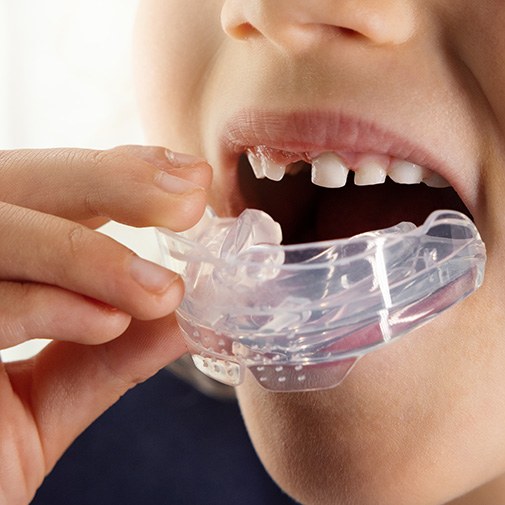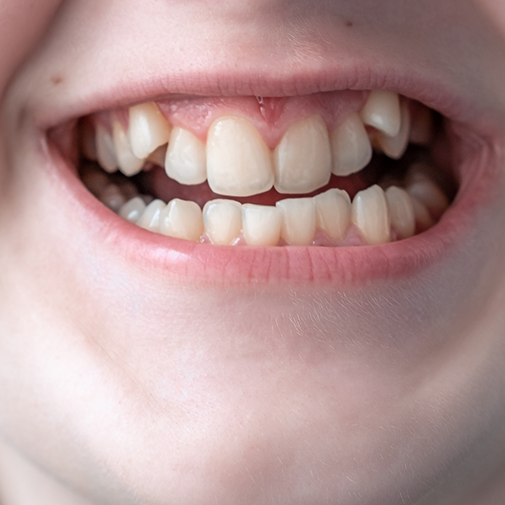Phase 1 Orthodontics Heath & Mt. Vernon
Begin Improving Your Child's Smile

Your child’s smile is one of the most precious things in the world, and you’d do anything to make sure it’s healthy, happy, and strong throughout their lifetime. In addition to taking them in for regular dental visits, the American Association of Orthodontists recommends that a child should a board-certified orthodontist by the time they are about 7 years old. Why?
By this time, all of the baby teeth should have erupted, and this will allow an orthodontist to see how a child’s teeth, jaw, and face are developing. With these early appointments, they’ll be able to spot any existing problems as well as recommend treatment. With Phase 1 Orthodontics, a child can start getting the care they need today without having to wait until their teen years when regular braces would be most effective. To schedule a FREE consultation, contact us today.
Why Choose Wigal Orthodontics of Heath or Mt. Vernon for Phase 1 Orthodontics?
- Knowledgeable Orthodontists Who Pursue Regular Continuing Education
- Orthodontic Team Committed to Crafting a Comfortable Patient Environment
- We Welcome Many Dental Insurance Plans
How Phase 1 Orthodontics Works

Phase 1 Orthodontics in Heath and Mt. Vernon can be used when a child still has some of their baby teeth and before all of their permanent ones have erupted (Phase 2 is for when the permanent teeth have emerged). It will usually consist of braces or a simpler orthodontic appliance.
While it might be easy to think that misaligned baby teeth are harmless because they’ll eventually fall out, this is far from true. The baby teeth actually play an important role in clearing the path for the permanent teeth as well as enabling your child to eat, speak, and breathe comfortably.
Issues with the baby teeth can often lead to problems in all of these areas, and without early intervention, a child will usually need more involved and extended treatments to correct their problems. The point of Phase 1 Orthodontics is to avoid and lessen future orthodontic problems by mitigating and correcting current ones.
Who is a Good Candidate for Phase 1 Orthodontics?

Your child may benefit from Phase 1 Orthodontics if:
- They have crooked, crowded, or gapped teeth
- They have protruding teeth
- Their teeth don’t come together correctly
- They have habits that could affect their dental development (such as thumb/digit sucking)
- They have speaking issues
- They have problems breathing comfortably
- Their jaw isn’t in proportion to the rest of their head
- Incoming adult teeth are being obstructed by baby teeth
Even if your child doesn’t exhibit any of these symptoms, they may still be able to benefit from Phase 1 Orthodontics. How? A child is constantly growing and changing, and just because they don’t need orthodontics now doesn’t mean they won’t later. By perfectly timing your child’s treatment, your orthodontist will be able to achieve the best results with the least amount of effort, which is ideal for everyone.
The Benefits of Phase 1 Orthodontics

Children’s orthodontics is much simpler, easier, and faster compared to treating an adult, as the bones of their face have not fully developed yet. With Phase 1 Orthodontics, we can stop future problems before they even start and help your child get a beautiful smile they’ll always be proud to show off. It allows us to fix dental, developmental, and even sleep issues now rather than leaving you to manage the symptoms. Plus, it helps a child develop a more confident smile sooner, which can make things like school and socializing much easier.
What Happens After Phase 1 Orthodontics?

After your child has completed their Phase 1 treatment, their orthodontist will wait about a year or so they can “rest” before beginning the next phase. This will give their mouth time to develop naturally so their orthodontist can then evaluate and determine which treatments they may need. Phase 2 treatment can correct any issues involving the permanent teeth, which should decrease with Phase 1. In some cases, Phase 2 treatment may not be needed if a child’s needs were completely addressed during Phase 1.
While numerous general dentists are willing to offer traditional braces, your child should always be evaluated and treated by a fully-trained orthodontist like Dr. Timothy Wigal or Dr. Alex Kluemper. They’ll be able to have a better understanding of your child’s situation, which will enable them to fully customize their treatment so they can get the maximum benefit. Also, this will ensure that their treatment is effective, comfortable, and efficient, helping them get the most results in the least amount of time.
Phase 1 Orthodontics FAQs
Is Phase 1 Orthodontics Painful?
While the placement of the appliance is painless, it is normal for soreness and discomfort to arise in the days afterward. The good news is that it’s only temporary. Plus, there are several ways you can alleviate symptoms like these even sooner, like using a cold compress for 10 minutes at a time, eating only extremely soft foods, and taking OTC pain medication for kids as directed.
Is it Okay for a Child to Play Sports While Wearing Braces?
The majority of the time, yes. Just make sure that they wear a mouthguard to protect their teeth, gums, and braces from harm. If they don’t have one already, let us know! We can have a custom one made that fits comfortably and is the appropriate thickness for the sport they play.
Is Phase 1 Orthodontics Covered by Insurance?
Some dental insurance providers do cover a portion of the cost, yes. So, if you are insured, it’s worth looking through the fine print on your plan! Our team at Wigal Orthodontics would be happy to assist with this process as well, so don’t hesitate to provide us with your membership information. That way, we can take a look at the fine print, review your available benefits, and provide you with an estimate of your out-of-pocket expenses.
Important reminder: If you don’t have dental insurance, that’s okay – that’s not the only financial solution available! We also welcome flexible financing with CareCredit and offer periodic specials so the cost of Phase 1 Orthodontics in Heath & Mt. Vernon can fit comfortably into just about every budget.
How Long Does Phase 1 Orthodontic Treatment Last?
There are several factors that play a role in the answer, including the complexity of your child’s case. With that said, the average treatment timeline for Phase 1 Orthodontics is 9-12 months. When you and your little one visit our office, we can provide a more precise estimate and share what to do (as well as what NOT to do) to avoid frustrating delays.
What Changes Should My Child Make While Wearing Braces?
There are a few adjustments that need to be made to their day-to-day routine, starting with avoiding crunchy and sticky foods, like hard pretzels and caramel-filled candies. They also need to be diligent about brushing twice a day, flossing every night before bed, and keeping their appliance clean. That way, they don’t develop tooth decay or any other oral health problems during their orthodontic treatment.
How Do I Know My Child Needs Phase 1 Orthodontics?
Do your child’s teeth crowd together to the point that they overlap? Are their emerging adult teeth being obstructed by their baby teeth? Are they having difficulty enunciating clearly? If you answered “yes” to any of these questions, then they may benefit from Phase 1 Orthodontics! Of course, the only way to know for certain is by scheduling a consultation at our office. That way, we can learn more about your concerns, complete a comprehensive oral exam, and determine if this orthodontic treatment would be beneficial!













